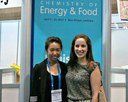Students Nancy Rivera and Deborah Gho Present at the American Chemical Society Conference

UC Davis students Nancy Rivera and Deborah Gho received internationally-competitive travel grants from the ACS which covered the cost of attending the conference. Rivera is a second-year master’s student in the Nutritional Biology Graduate Group and Deborah Gho is an undergraduate senior in Biochemistry and Molecular Biology and the Mentorship Student Coordinator for the Foods for Health Institute (FFHI).
At the ACS conference, Rivera presented work based on her master’s thesis on high-density lipoprotein (HDL) structure and composition; HDL is often called “good cholesterol” because higher HDL levels are associated with better cardiovascular health. Rivera presented the results from a human trial she conducted under the direction of Principal Investigator Dr. Jennifer Smilowitz, Associate Director of the FFHI. Rivera carried out this project from inception to completion and was thrilled to present her research findings for the first time in a public setting at the ACS conference.
The HDL research study examined the effects of bioactive ingredients on plasma HDL particle structure through its size distribution and concentrations. HDL particle size is not commonly measured in the clinical setting, but Rivera argues that it is important because HDL structure determines its function. The study recorded the effects of certain food ingredients known to change HDL size distribution and concentration such as dairy phospholipids, krill oil, lutein, and niacin.
Deborah Gho presented research under the direction of Principal Investigators Dr. Mark Underwood, neonatologist of the UC Davis Neonatal Intensive Care Unit, and Dr. Jennifer Smilowitz, Associate Director of the FFHI, which forms the bulk of her clinical experiences as an undergraduate student. This “final project” culminated from three years in the FFHI Undergraduate Mentorship Program where Gho worked on a project designed to validate the use of an instrument in the neonatal intensive care unit for the accurate measurement of premature breast milk for protein levels. At the ACS conference, Gho received special recognition and won first place in the research presentation competition. 
Breast milk is the ideal food source for infants, but for extremely premature babies, their mother’s milk is often nutritionally inadequate to provide optimal growth and protection. Gho relates that the current method of feeding premature infants is to provide them their mother’s breast milk that is supplemented with a standard amount of protein. However, this approach can lead to underestimating protein intake and result in poor infant growth because it assumes that all premature milk is similar in composition. In fact, the nutritional quality of premature milk is highly variable, unlike the milk from women who carry full term. Gho argues that there is a need for individual fortification based on the protein levels rather than continuing to administer a standardized amount of protein to each mother’s milk.
For this project, Gho acquired milk samples from the UC Davis Lactation Study and the UC Davis Children’s Hospital in Sacramento and ran the samples through the “Lactoscope FTIR” manufactured by Delta Instruments. The breast milk samples were also measured using biochemical laboratory techniques to determine the accuracy of the Lactoscope. This instrument precisely measured fat and protein, and calculated lactose which are visible in the mid-infrared spectral region.
Gho believes that this instrument is part of emerging technologies that will vastly improve the way neonatal infants are fed. The Lactoscope FTIR still needs perfecting to determine the best standards for use in calibrating the instrument, but it accurately measured protein. The use of this instrument shows promise to administer individualized fortification and improve the growth and development of extremely preterm infants.
As part of her undergraduate training, Deborah Gho saw the first-hand impact of these technologies when she shadowed medical doctor Dr. Mark Underwood and his residents for two weeks in the Neonatal Intensive Care Unit. This direct experience inspired Gho to apply to professional school and hopefully continue her important work in improving the health outcomes of preterm and underweight infants.
Nancy Rivera also has plans for medical school. Rivera will present her work on plasma lipoprotein metabolism at the Experimental Biology Conference in Boston where she secured a travel grant through the American Society for Nutrition.
Rivera and Gho attribute much of their success at ACS to their mentor, Dr. Jennifer Smilowitz. According to the students, Dr. Smilowitz inspired them to apply to the conference and secure funding for travel. Dr. Smilowitz worked with Rivera and Gho to ensure their successful presentations at ACS and both women feel very fortunate to have Dr. Smilowitz’s support.
Nancy Rivera and Deborah Gho are outstanding examples of the innovative and impressive work of FFHI-affiliated students and we are certain of their continued success in the medical field.